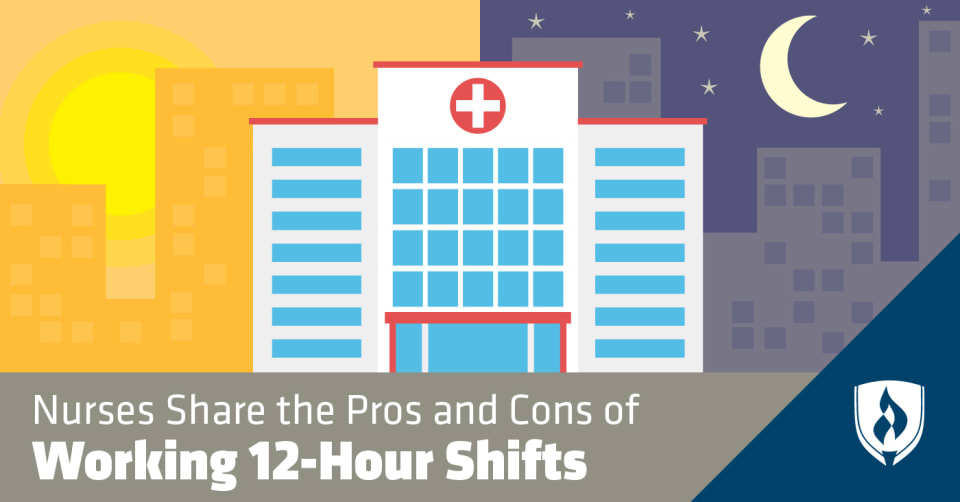
Nursing seems like the perfect fit for you. You can make a difference. You thrive in a fast-paced environment. You’re not squeamish, and you love caring for people. There’s just one problem—you’re not sure if you’re up for the 12-hour shift schedules many nurses work.
There are definitely challenges to this kind of schedule. You’ve seen the tired eye-bags and the comically large coffee cups. But you’ve also heard how great it can be—how much you can travel, volunteer and spend time with family on your days off.
If you’re trying to decide whether 12-hour shifts are a deal-breaker, look no further. We talked to those who’ve done it before, and they explained the ups, downs and tips for making the most of it.
But first, you might have some questions about how 12-hour shifts even work for a weekly schedule. A look at the anatomy of a typical week with this kind of schedule might provide some helpful context.
Get Your Nursing School Questions Answered at a Nursing Information Session
How do 12-hour shifts work?
You’ve done the math. 24 hours in a day minus a 12-hour shift still leaves 12 hours. Well, minus at least eight for sleeping, 30 minutes for the commute each way, another hour to get ready for bed at night and prep for work in the morning. Throw in 45 for making, eating, and packing meals. That leaves you exactly an hour and fifteen minutes to… watch TV? Spend time with your family? Leave room for trouble falling asleep or traffic in the morning?
You know that 12-hour shifts work because nurses do them every day, but how exactly do they work? How do they impact your life, your family and your schedule? What is expected of you? What options do you have? Every nurse wonders the same things as they weigh the pros and cons of working 12-hour shifts. To help you get a feel for the format, let’s take a look at a hypothetical week of a nurse working on a 12-hour shift schedule.
Monday: Seven a.m. starts your first shift at the hospital. Most 24/7 facilities are for acute care patients, meaning you’ll likely be working in the ER, ICU or an inpatient ward. As the night nurses give you a report and check out, you settle in for the morning rush.
About four hours in, you get a 15-minute break, but one of your patients needs another dose of pain medication, so you cut it short. In another four hours, you’ll get a longer meal break, and you’ll have to push to get all 30 minutes. For your last 15-minute break, you sit still in a dark room, sip a cup of coffee and catch your breath. Seven p.m. hits and it’s time to wrap up and tag-in your back-up, as long as all goes to plan.
Tuesday: You managed to get to sleep on time, and you’re ready to do it all again—albeit a little more worn down.
Wednesday: Some nurses like to stack their shifts three in a row and have the next four days off, but you start to feel worn out after two and schedule your shifts apart. Today, you rest and recover while maybe taking on a few of minor “weekend” to-dos.
Thursday: Another day off. You’ve caught up on sleep and are ready to do the things 9-5ers don’t get to do on a Thursday afternoon. Watch a movie in the middle of the day, go to the DMV, cook yourself an outrageous dinner. Enjoy this time because at seven p.m. you’re up for the night shift.
Friday: While most nurses stick to either all days or all nights, some work a rotating schedule. This can be difficult on your sleep patterns, but it also can be helpful to get to know both sides of the clock. Depending on the employer, you may receive a shift differential pay bump for working night shifts, as well.
Saturday: You’re lucky. It isn’t your weekend. Most hospitals require nurses to work a certain number of weekends a month. They also keep track of holidays to ensure that employees don’t have to work more than their fair share.
Sunday: You’ve had a nice break. You packed your lunch and washed your scrubs. You know the next two days will be long, but you’re ready for a bright and early seven a.m.
Another factor that can complicate your schedule is the need to potentially cover for other nurses in your unit—in any given week you may be picking up an additional shift (or portion of a shift) to make sure staffing levels are met. While most employers will try to avoid burnout-level scheduling for weeks on end, there’s likely to be some less-than-ideal schedules coming your way.
The advantages of working 12-hour shift schedules
Obviously these days can be long—but what are the potential benefits or advantages to this scheduling approach?
Fewer patient handoffs
Patient handoffs are often a weak link in the chain of healthcare. A study by The Joint Commission found that 37 percent of the handoffs examined were unsuccessful—meaning potentially inaccurate medication doses, missed medication, undocumented symptom changes and so on.1
By working 12-hour shifts, nurses reduce the number of handoffs and with that the potential for errors associated with them. While it may seem like adding one more handoff couldn’t be that much worse, the number of deaths and injuries caused by miscommunication is nothing to be taken lightly.
This advantage may not directly benefit nurses, but as most of them care deeply about the patients they serve, it is an important factor to consider.
More time off
This is the no-brainer advantage of a 12-hour shift schedule—your “daily grind” isn’t as regular. Whether you’ve done the nine to five or just can’t picture yourself working eight hours for five days in a row, having four days off every week is hard to beat. It is important to take into account recovery time, but even having three full days allows you so much freedom. Not only can you have fun and relax, but you can take care of things that are difficult to squeeze into weekends and evenings—having an appointment in the middle of a Thursday afternoon takes less coordinating to accommodate.
Less time commuting
If you live a distance from your employer, this can be a small but mighty advantage. Not only do you save time, but also money on gas and car maintenance in the long run. Cutting your commute by two or three days means even more time to walk the dog, clean the house or do any number of things you’d rather be doing instead of sitting in traffic.
The “flow”
If you’ve ever done something long enough that it came as second nature, you know what the flow is. Maybe you tied a hundred water balloons for your nephew’s birthday party. Around balloon 45 or so, your fingers started moving in and out of the knots like they’d been doing it forever.
This may sound like a made-up advantage, but there’s something to be said for consistent, uninterrupted work. Hilary Erickson, RN and creator of Pulling Curls, agrees that longer shifts facilitate more flow, saying that for most people, there is a “1 hour ‘cool down’ period after any shift.” In other words, less shifts means less time interrupting your focus.
The disadvantages of working 12-hour shift schedules
Every job has its disadvantages, but as a nurse, they can range from inconvenient to just plain dangerous if you don’t manage them well. As you consider these points, take an honest inventory of your ability to navigate them.
Fatigue
Depending on whether you work day shift, night shift, or a rotating schedule, you may be more or less fatigued but fatigued none the less. Your feet will get sore, your body will ache, and by the end of the shift you’re probably not going to be up for much mental strain. If you’re working overnight shifts, you may also have trouble getting your sleep schedule adjusted—and the cumulative effects can be rough.
Long-term health risks
When you are working for 12 hours there is often little time before, during and after your shifts to eat healthy meals or exercise properly. This combined with fatigue and other adverse factors can result in some serious health risks including depression, anxiety and insomnia.2
Nurses working these shifts should make a conscious effort to carve out time for self-care—perfectly healthy choices might not always be feasible on a shift day, so do your best to counterbalance it on off days.
Impact on your social life
Even if you love the schedule, having your days off fall in the middle of the week while most people are working traditional schedules means sometimes you’ll have limited windows of time to spend with others. Additionally, working at 24/7 healthcare facilities means you’re going to be scheduled for holidays and other times of the year where you may traditionally get to see family and friends—so you may have to make some compromises.
Increased potential for errors
While fewer handoffs may reduce errors related to miscommunication, working longer shifts can also increase errors related to fatigue. A study by Health Affairs found that nurses were three times more likely to make a mistake when working 12.5-hour shifts or longer.3
Erickson admits, “I really feel like care isn't as good in hour 11 as it was in hour three.” While there are things hospitals can do to reduce these errors, mistakes are inevitable. This uncertainty can be one of the most difficult aspects of nursing.
A shift is rarely just 12
Between handoff procedures, new admissions, discharges, and other patient needs, most 12-hour shifts easily become 13 to 14-hours long.3 This not only decreases the time you get to rest and recover for your next shift but increases the errors related to fatigue.
Tips for working 12-hour shifts
When it comes down to it, your passion for nursing may outweigh your doubts about 12-hour shifts. It's complicated now, but it may be as simple as saying yes to a job and figuring out what works best for you when it comes to managing those long hours. Here are some tips to get you started:
- Take your breaks as best you can
- Pack healthy snacks
- Keep non-work plans to a minimum on your workdays
- If you are working night shifts, invest in blackout curtains to help you sleep during the day
Do you have both sides of the story?
12-hour shifts might not be for you, and that’s okay. No matter your thoughts on working this type of schedule, it’s important to remember that not all nursing roles use this approach—a more typical 9-5 work life can be found in clinics and other nursing settings.
Learning more about the potential pros and cons of 12-hour shifts in nursing is a good start, but there’s plenty to learn about becoming a registered nurse. Our article, “What I Wish Someone Told Me BEFORE Becoming a Registered Nurse,” asks current nurses to share the things they think would-be nurses need to know before getting started.
1The Joint Commission, Sentinel Event Alert, Inadequate hand-off communication [accessed October, 2019] https://www.jointcommission.org/assets/1/18/SEA_58_Hand_off_Comms_9_6_17_FINAL_(1).pdf
2Huang CL-C, Wu M-p, Ho C-H, Wang J-J, Risks of treated anxiety, depression, and insomnia among nurses: A nationwide longitudinal cohort study, PLOS One, [accessed October 2019] https://journals.plos.org/plosone/article?id=10.1371/journal.pone.0204224
3Health Affairs, The Working Hours of Hospital Staff Nurses and Patient Safety [accessed October 2019] https://www.healthaffairs.org/doi/full/10.1377/hlthaff.23.4.202




